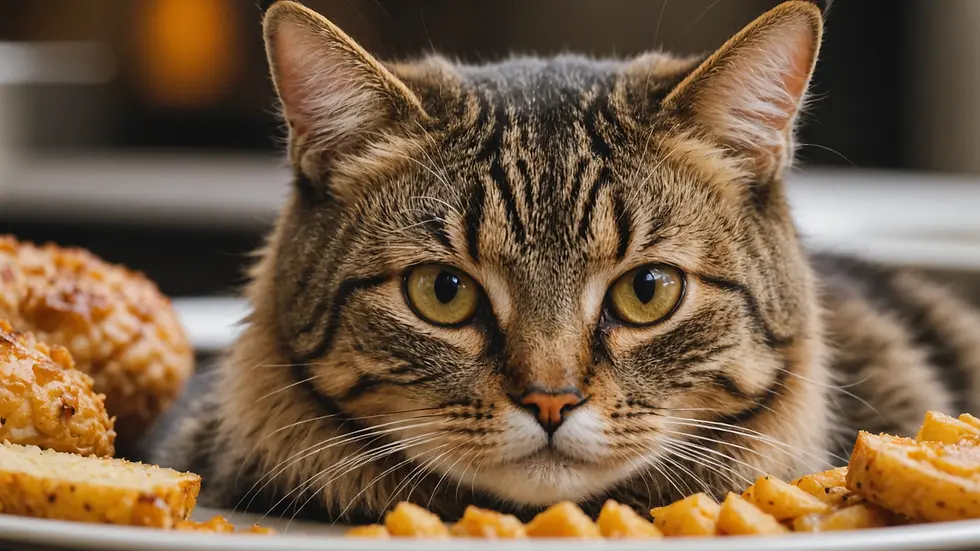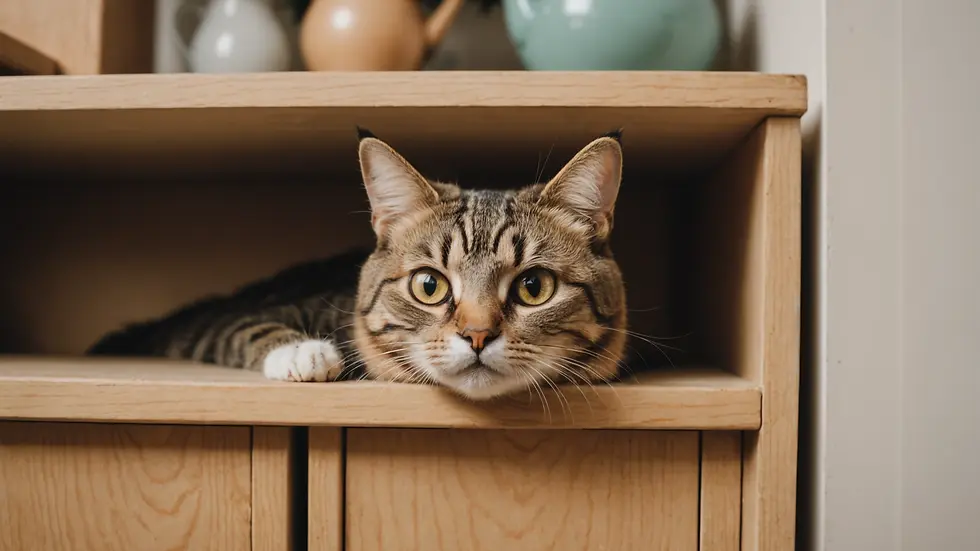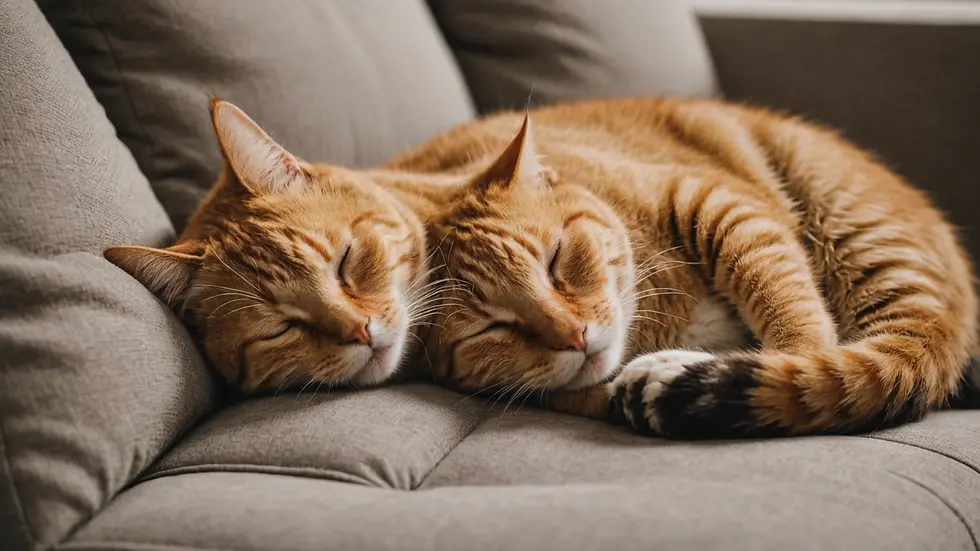Unusual Behaviors: Could Your Cat Be Showing Signs That It Needs a Vet Visit?
- Jyotiraj Borah
- Feb 5
- 4 min read
Cats can be quite enigmatic, often exhibiting behaviors that leave their owners scratching their heads. As cherished companions, they express their needs in various ways, sometimes indicating that their health may be at risk. Identifying these signals is essential for every cat owner.
In this article, we will delve into various unusual behaviors that could suggest your feline friend needs a vet visit. Being aware of these signs is key to ensuring your cat remains healthy and happy.
Loss of Appetite
A sudden drop in appetite can be one of the first signs that something is wrong. If your cat, who used to eagerly devour meals, suddenly shows little interest in food, it’s time to act. In fact, studies suggest that a loss of 10% of body weight over a few weeks can indicate serious health issues.
Make sure your cat is drinking water normally. Dehydration can quickly become a dangerous issue, particularly if your cat refuses to eat or drink.
Keep an eye on their eating habits—an irregular pattern, such as not eating for 24 hours or more, could relate to underlying problems like dental issues or gastrointestinal disorders.

Sudden Changes in Behavior
Cats can be finely tuned to their environments, so sudden shifts in their behavior can raise alarms. If your lively cat is now hiding more or has become uncharacteristically aggressive, this change should not be ignored.
Observe any drastic shifts in their behavior. For example, if ingredients in your home environment have changed—such as a new pet or alterations in your daily routine—monitoring their response is crucial.
Consistent changes, however, may suggest pain, discomfort, or even depression, which all warrant a vet’s evaluation.

Vomiting and Diarrhea
While an occasional hairball or one-time vomiting episode is typically not worrisome, continuous vomiting or diarrhea signals potential serious problems. Research shows that up to 5% of a cat’s weight can be lost due to dehydration, which can occur quickly with these symptoms.
Reasons behind frequent gastrointestinal distress can range from dietary changes to consuming harmful substances. If your cat exhibits persistent vomiting or diarrhea, contacting your vet promptly is essential to determine the cause and get the necessary treatment.
Lethargy or Increased Sleeping
Cats are renowned for their love of sleep, but a sudden spike in lethargy or trouble waking them might warrant a closer look. While cats generally sleep 12 to 16 hours a day, a lack of energy or an uncharacteristic unwillingness to engage in play is a clear red flag.
Monitor your cat’s activity levels: if they are not responding to their favorite toys or games, consult with your vet. Health issues such as infections or pain could lead to this sudden fatigue.

Changes in Grooming Habits
Cats usually maintain meticulous grooming habits, so any deviations can indicate health problems. If you notice your cat neglecting their grooming routine or appearing unkempt, a visit to the vet may be needed.
Decreased grooming may suggest dental pain, skin issues, or even illnesses that prevent them from grooming properly.
On the other hand, if your cat is over-grooming to the point of developing bald spots, this could indicate stress or skin irritation. Both situations should prompt a veterinary consultation.
Changes in Urination and Defecation
Pay close attention to your cat’s litter box habits. Changes in urination or defecation can be symptoms of serious health problems, including increased frequency, straining, blood in urine, or persistent diarrhea.
If you observe any alterations in their bathroom habits, reach out to your veterinarian. Problems like urinary tract infections, kidney disease, or diabetes may be at play, and early detection is often key to effective treatment.
Excessive Vocalization
Although some cats are naturally more vocal than others, a sudden increase in meowing or yowling can signal discomfort or stress. Cats often vocalize to express anxiety, especially if they are not feeling well.
If your cat begins to vocalize more than usual, consider any recent changes in their environment or daily routine. If the excessive vocalization persists without clear reasons, it is advisable to consult your vet.
Weight Loss or Gain
Noticing a significant change in your cat’s weight can point to underlying health issues. For example, a cat experiencing unexplained weight loss may have conditions such as hyperthyroidism, which affects around 10% of older cats.
Conversely, unexpected weight gain often indicates dietary issues or potential health complications. Regular weigh-ins at home or during vet visits can help you keep track of your cat's health.
Scratching or Bite Marks
If you find your cat scratching more than usual or noticing bite marks that seem unusual, this may indicate various health concerns. From parasites like fleas and ticks to allergies or infections, skin issues can vary widely in severity.
Discuss these observations with your veterinarian to ensure your cat gets the appropriate diagnosis and treatment if necessary.
Dental Health Issues
Dental disease is frequently overlooked in cats, yet it is a common problem. Signs of dental issues can include bad breath, difficulty chewing, or visible plaque on teeth. It's important to note that approximately 70% of cats over the age of three show signs of dental disease.
Regular dental check-ups and cleanings are crucial for maintaining oral health. If you observe discomfort while your cat eats or changes linked to their chewing habits, consult your vet as soon as possible.
Altered Social Interactions
Cats typically exhibit distinct social behaviors, and changes in these patterns can signal health issues. For example, if your once social cat begins isolating itself or displays increased irritability, it might reflect underlying discomfort or pain.
Awareness of these changes in social dynamics is essential. Stress or depression can also play a role, making it imperative for owners to recognize any behavioral shifts.
Final Thoughts on Your Cat's Health
Recognizing the signs that your cat may need a vet visit is crucial for its health. As independent creatures, cats often do not vocalize their discomfort or pain. Therefore, it is essential for owners to be observant and informed about their behaviors.
While some changes may seem minor at first, attending to them early can help prevent more significant health issues later on. Regular vet visits, close observation, and a good understanding of your cat's individual behaviors can lead to a healthier, happier life for your furry friend.
Stay vigilant, and never hesitate to consult your veterinarian if you notice any unusual behaviors. Your cat's health is always worth it!




コメント